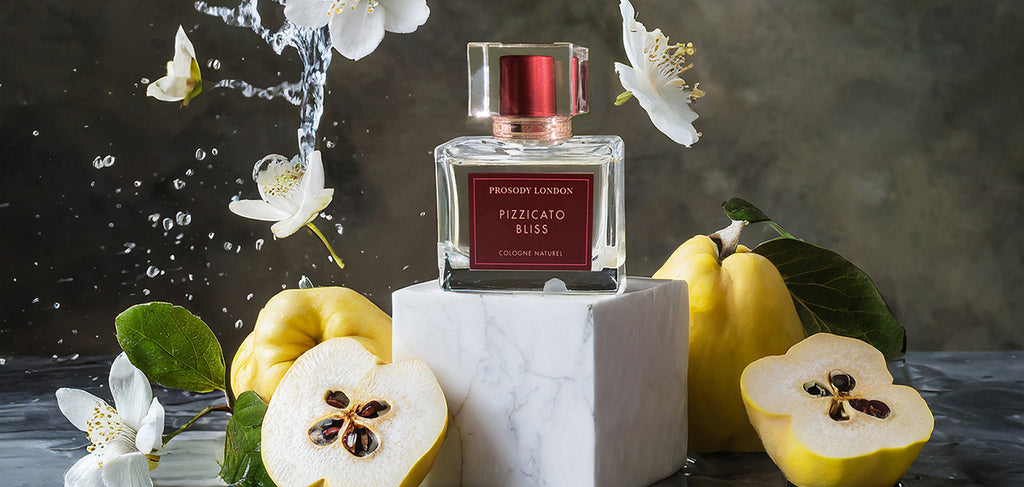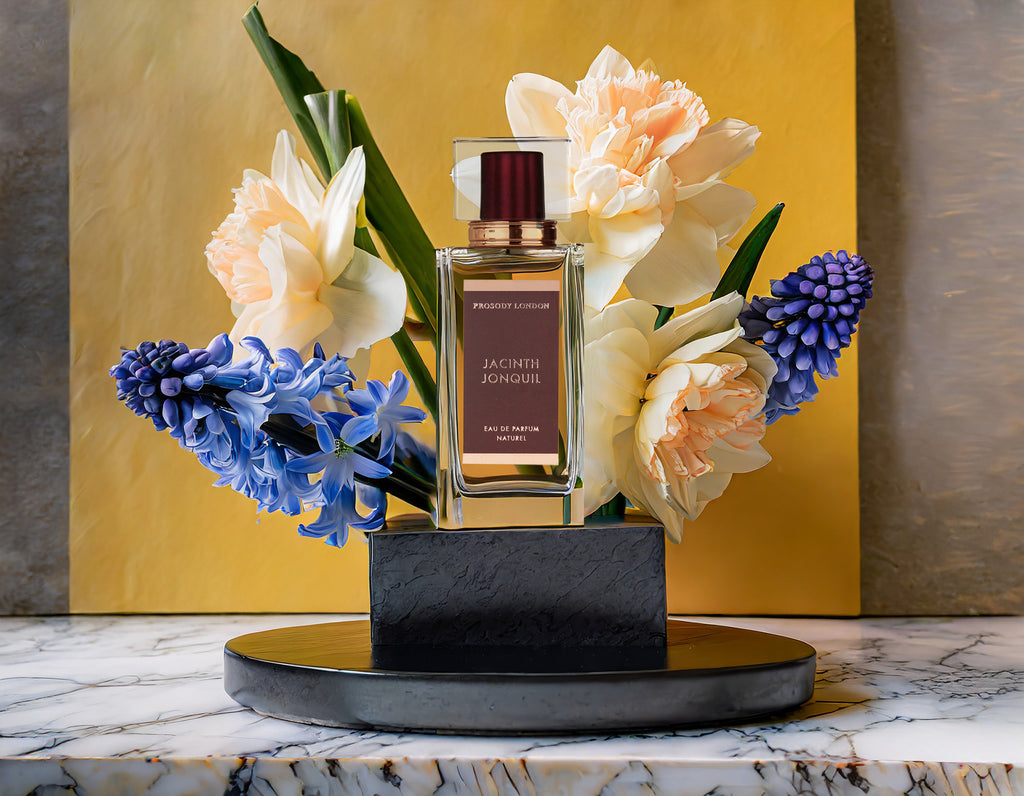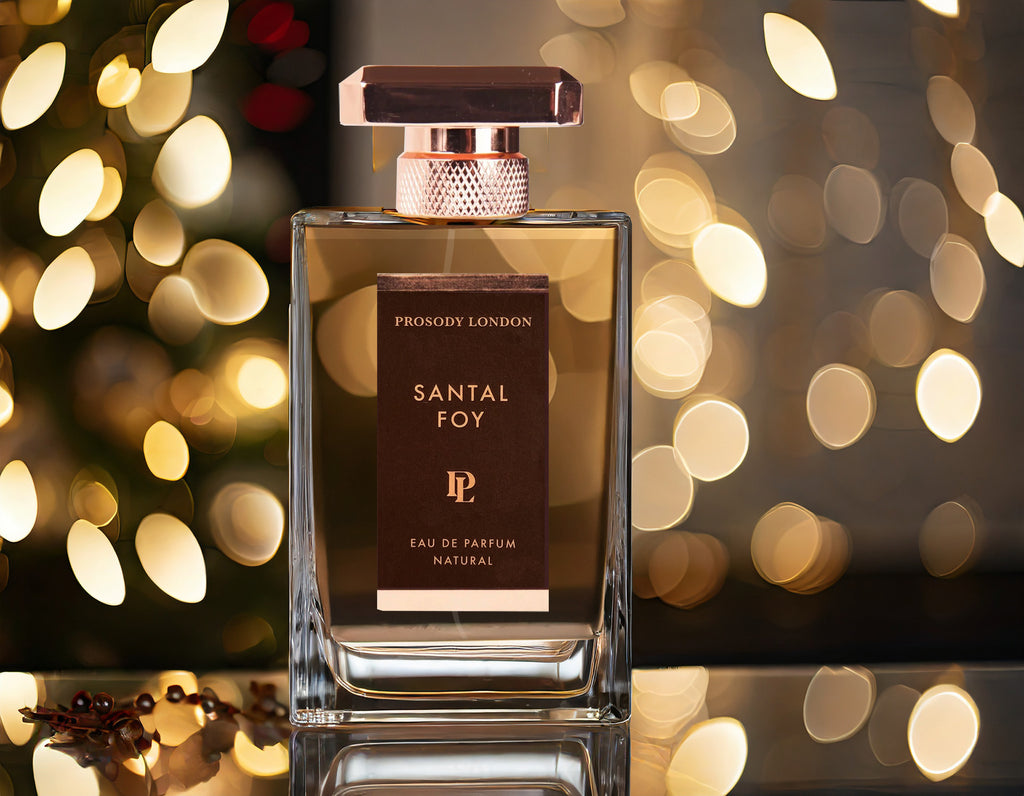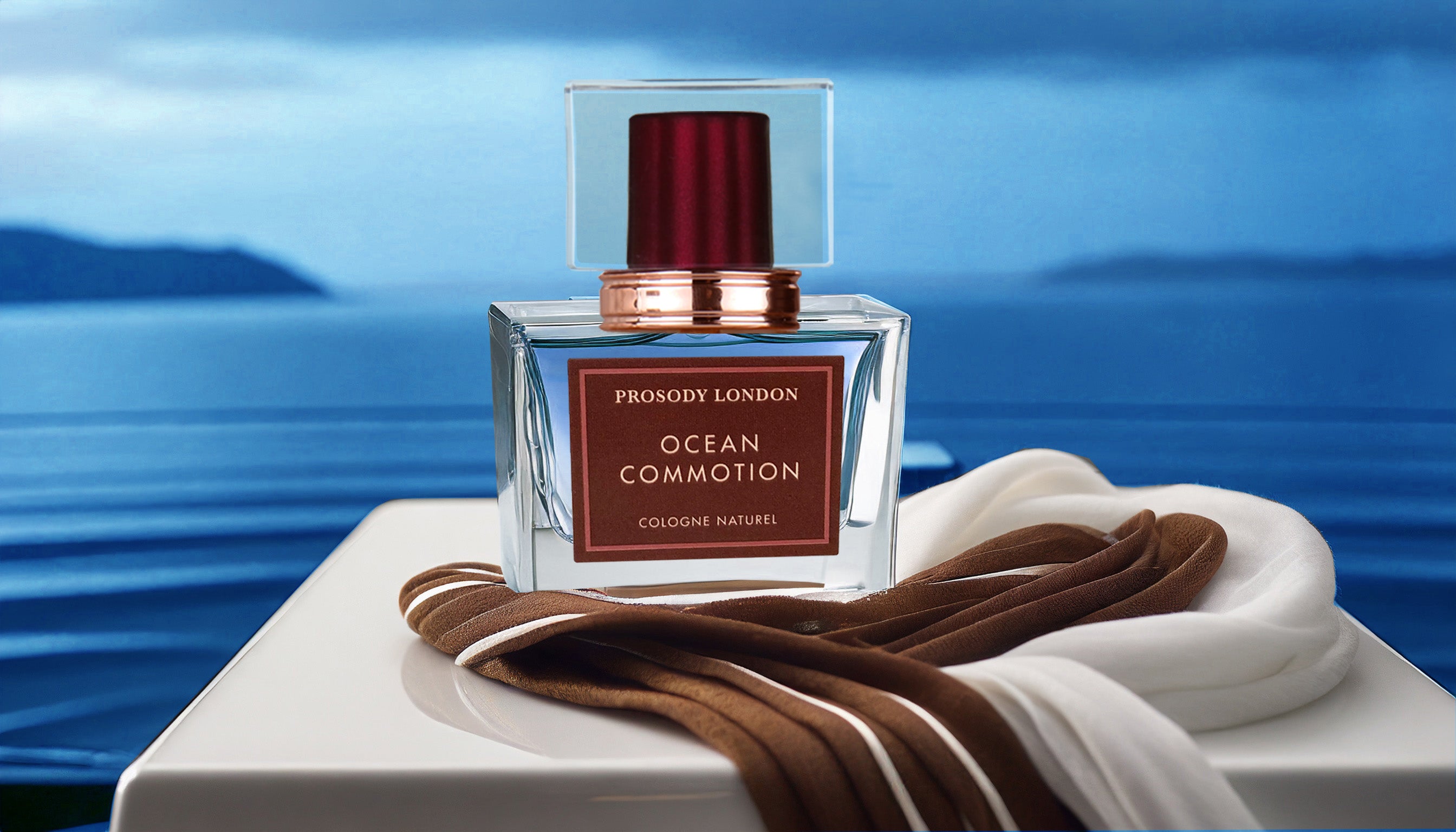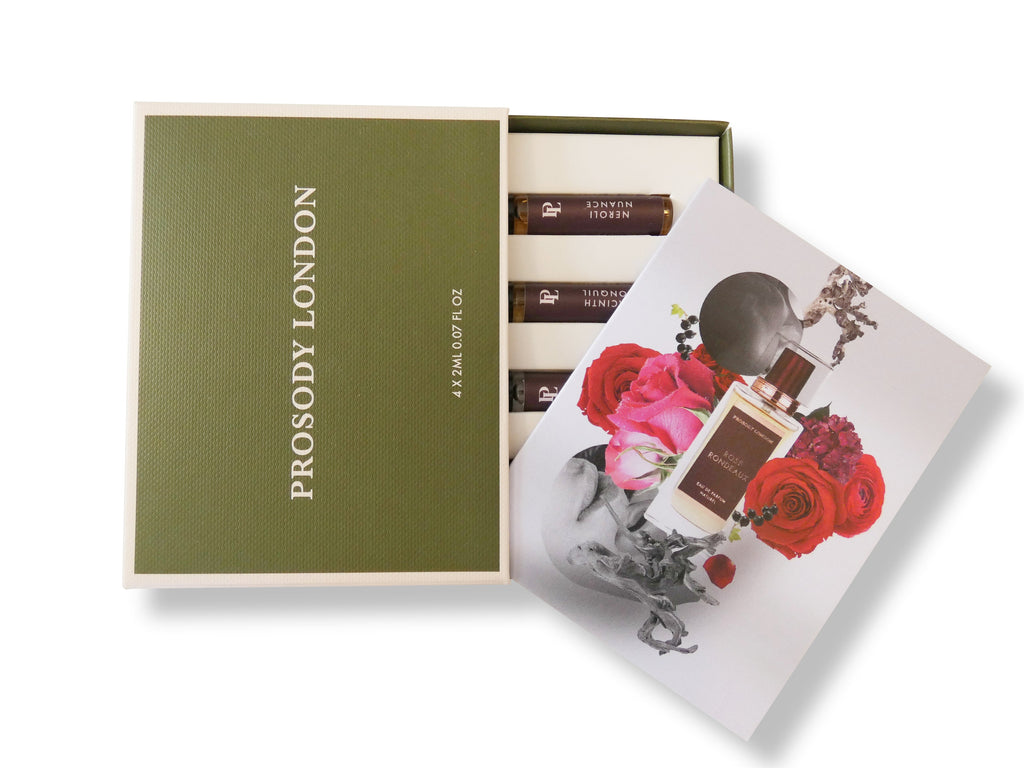How to shop for Natural Perfume – the essential guide
To truly understand how to shop for natural perfume we should first distinguish natural from synthetic fragrances. The critical difference between these quite distinct fragrance categories stems from their basic ingredients and composition:
Source of ingredients:
Natural perfume uses exclusively oils and essences derived from plant, animal, or mineral sources. Prosody London perfume of course rigorously excludes animal products (eg musk, civet). Indeed it is reasonable to say that our perfumes are vegan, since they contain no animal or mineral substances.
Synthetic perfume: The majority of commercially produced perfumes, whether high-volume fine fragrance for use on skin or in cosmetics, room fragrance, scent in candles or the formulas added to products such as detergent to mask the unpleasant smell of the primary compounds these products are made from, use ingredients derived from petrochemicals, fractionated from the same crude oil that is refined to make fuel for your car. With ingenuity in the lab petrochem derivatives can be adapted to almost any imaginable scent profile (and the chemistry sometimes produces interesting, even fascinating, profiles that could hardly be imagined before experiment stumbled upon them). Wearing synthetics on your skin, albeit in very tiny amounts, may result in a build up of chemical residues, whether you can smell them or not, which may be impossible to detox.
Basic perfume composition
The scent ingredients from which perfumes are composed release their odour more or less quickly and continue to ‘speak’ (to be detectable within the overall composition) for a shorter or longer time. The most immediately apparent ingredients tend also to be the most volatile (literally, they evaporate faster).
Perfumes are always made from carefully calibrated combinations of scent ingredients in order to provide a sustained and unified impression over several hours. The art is one of structuring the more and less volatile materilas in the overall composition to give a unified and satisfying experience as the balance between them gradually alters with time.
The standard approach to structuring a fine fragrance is to think in terms of top notes, middle notes and base notes. The top will be instantly engaging and attractive, the middle should support this with a related character that sustains the initial impression for longer and the base should harmonise pleasingly with the ‘higher’ layers so that when, usuallyafter many hours, only the base is still really detectible, the impression is still pleasing and consistent with the initial character.
Natural perfume categories
Natural perfumes can be made in all the main categories that perfumes are produced in (and which are also applied to synthetic and part-synthetic fragrances). So if you are thinking of switching to natural from some favourite synthetic fragrance start by reflecting on the category it belongs to. Categories in fragrance are generic types that offer a classic profile on which many perfumers and perfume houses have developed variations over the decades. Let’s have a look at the main Fragrance categories:
Citrus
Citrus scents are are generally clean and invigorating in style. Sharp, zesty aromas of lemon, lime and orange (not to mention rarer relatives such as bergamot, a naturally bitter variety of orange) have a very immediate presence and character. They are in general very ‘toppy’ – they register the moment the fragrance is sprayed but in a short time much of this has faded.
Such perfumes need to be refreshed more often through the day if worn on skin. If sprayed on a scarf or handkerchief however they will last a bit longer, but the top notes are always the first to speak and to fade.
Liquid sunlight
Citrus scents can be energizing and uplifting. Vibrant and tangy, they instil a mood of serene alertness. Sweeter citrus, such as orange, can also have a comforting quality.
Citrus scents are can be worn all year round but their fresh, outdoor character (the aspect perfumers commonly accentuate when using them) feels especially appropriate in spring and summer. While the range of citrus fruits is quite wide (including grapefruit, pomelo, kumqat and many varieties and grades of bergamot) the basic character is always pleasantly penetrating and clean.
Floral – delicate, colourful, strongly charactered
Sensory appeal
Flowers are perhaps the most attractively scented things in nature and efforts to capture and preserve their olfactive charms are among the earliest recorded techniques in the development of perfumery. It is said to have the been the ancient Persians who first attempted, with alcohol and oils, to woo the intoxicating scent of the rose from its petals into something that could be carried in a bottle.
The eternal feminine
Floral notes are commonly associated with femininity and elegance. The soft, sweet, and sometimes powdery characteristics of floral perfumes can evoke a sense of sophistication and grace.
Romantic and alluring
Many floral scents are considered romantic and alluring. The association of certain flowers with love and romance, such as roses, contributes to the perception of floral perfumes as ideal choices for special occasions or intimate moments
Variety of Floral Notes: The diversity of floral notes allows for a wide range of perfumes catering to different preferences. Whether it’s the sweetness of jasmine, the freshness of mimosa, or the romantic allure of roses, the sexiness of Orange blossom, there’s a floral note for every taste.
Oriental – warm and exotic
People are drawn to oriental perfumes for a variety of reasons, and the popularity of these fragrances can be attributed to a combination of sensory, cultural, and personal factors. A typical oriental perfumes would have vanila, resins like frankincense, olibanum, myrrh just to name a few. Here are some reasons why people may enjoy oriental perfumes:
Warmth and Sensuality: The warmth of oriental notes, such as vanilla, amber, and spices, contributes to a sensual and inviting quality. These fragrances are often associated with comfort, intimacy, and a feeling of coziness.
Long-Lasting: Many oriental fragrances are known for their longevity. The heavier and more concentrated nature of these scents often means that they linger on the skin for an extended period, providing a lasting impression.
Evening and Special Occasions: The depth and intensity of oriental perfumes make them well-suited for evening wear and special occasions. Many people associate these fragrances with sophistication and glamour.
Woody – grounded and earthy
People are often drawn to woody perfumes for various reasons, and the popularity of these fragrances can be attributed to several factors. Here’s why individuals might enjoy woody scents:
Natural and Earthy: Woody perfumes often feature notes derived from trees, such as cedarwood, sandalwood, or vetiver. The earthy and natural qualities of these scents can evoke a connection to the outdoors and a sense of grounding.
Timeless Appeal: Woody fragrances are considered classics in the perfume world. Their enduring popularity stems from their versatility and the fact that many wood-based notes have been used in perfumery for centuries.
Gender-Neutral: Woody perfumes are often appreciated for their gender-neutral appeal. The earthy and balanced characteristics make them suitable for individuals of all genders, contributing to their broad popularity.
Long-Lasting: Many woody notes, such as sandalwood and cedarwood, are known for their longevity. This makes woody perfumes a popular choice for individuals who prefer fragrances that last throughout the day.
Aquatic – crisp and clean
People are often drawn to aquatic perfumes for several reasons, and the popularity of these fragrances can be attributed to a combination of sensory, psychological, and cultural factors. Here’s why individuals might enjoy aquatic scents:
Fresh and Clean Sensation: Aquatic perfumes are known for their fresh and clean qualities. The crisp and watery notes evoke a sense of cleanliness and purity, making them appealing to individuals who enjoy light and refreshing scents.
Association with Water: Aquatic perfumes often incorporate notes that mimic the smell of water, sea breeze, or rain. This association with water can create a calming and soothing effect, reminding individuals of the ocean or a cool, clear lake.
Versatility: Aquatic fragrances are versatile and suitable for various occasions. Their light and airy nature makes them appropriate for everyday wear, as well as for summertime or casual settings.
Modern and Contemporary: Aquatic fragrances are often considered modern and contemporary. They appeal to individuals who appreciate a minimalist and streamlined aesthetic in their perfume choices.
Gourmand – sweet and food-inspired
People are often drawn to gourmand perfumes for various reasons, and the popularity of these fragrances can be attributed to a combination of sensory, psychological, and cultural factors. Here’s why individuals might enjoy gourmand scents:
Comfort and Familiarity: Gourmand perfumes often feature sweet and food-inspired notes, such as vanilla, caramel, chocolate, and various fruits. The familiarity of these scents can evoke feelings of comfort, reminiscent of favorite desserts and treats.
Indulgence and Pleasure: Gourmand fragrances are associated with indulgence and pleasure. The sweetness of these scents can provide a sensorial experience similar to enjoying a delicious treat, creating a sense of luxury and satisfaction.
Warmth and Coziness: The sweet and rich notes in gourmand perfumes can convey a feeling of warmth and coziness. These fragrances are often chosen for their ability to create a comforting and inviting atmosphere.
Emotional Connection: Gourmand scents can evoke positive emotions and memories. Individuals may be drawn to perfumes that remind them of special occasions, holidays, or moments spent baking or cooking.
Social Connections: Gourmand perfumes, with their delicious and inviting scents, can serve as conversation starters. Individuals may receive compliments and positive reactions, leading to social connections and interactions.
Sometimes a good natural perfume is just a bit of everything
Once you understand what you are drawn to, those categories are a rough guide in helping you to decide, in reality most creations are a bit of different categories, because whilst some perfume may have a central focus it will be supported by other categories too.
Ingredient classes
While the perfume categories are broad character styles of perfume, some ingredients that go into making perfumes are classified more narrowly into a system of typical ‘characters’ which in general are not in themselves used as the basis of a category. Here are some of the best known.
Animalic
Some natural perfume uses animal derived ingredients like ambergris, civet, castoruem and deer musk. They all have degrees of cruelty though not ambergris and although they are great aromatic fixative and adds sensuality to compositions, these ingredients are not sustainable practices. At Prosody London our perfumes are all botanical derived. Ingredients like Labdanum, Oud all are excellent replacement in this olfactive profile and offers the same fixative power as the animal derived ingredients.
Spicy
Statistically speaking most people dont like too much spice in perfume, a minuscue amount of cinnamon, cardomon, black pepper etc is all you need to elevate a fragrance composition, so we would never call a perfume spicy. If it is noticable than it is too crude, it should only ever make the ingredients more expansive, radiant and exciting.
Fruity
Frutiness brings all exciting facets of sweetness and tartness in a composition, but frankly too much would be over-sweet and sickly. This is not uncommon in less sophisticated perfumes. But you should find most natural fine fragrances are not too sweet or fruity.
Herbaceous
Nobody likes a perfume too herbaceous either. A little rosemary, thyme, myrtle, marjoram goes a long way. That’s because we use herbs or the camphor facets to balance up the sweetness or the floralness in the composition in case it feels to cloying. Lavender does that too but it is also considered as a floral so a larger quantity can be used in a blend, but because of this dual quality of Lavender it is bang on trend for unisex fragrance or male perfume.
Do you have my favourite synthetic perfume in natural?
We get asked this question a lot of times. It is a difficult one because contempory synthetic perfume would definitely have ISO E super and synthetic musk. According to Basenote – a perfumers forum there are some huge concerns expressed by the community. Natural perfume can’t replicate the radiance and sparkliness of ISO E super, so some wearers can be disappointed; the ISO e super may be the sole reason they love their perfume in the first place.
Synthetic Musks are problematic because a lot of them are simply non-biodegradble and may even be hormone disruptors.
Ambroxan is another popular ingredient in contempory perfumes. Fortunately this can be naturally derived from Clary Sage. We do use it because it adds a great sensuality and mimics the exceptional qualities of Ambergris. Obviously natural Ambroxan is a extremely expensive compared to synthetic ones. In our Ocean Commotion, Ambroxan gives the marine Ambergris quality loved by both men and women.
We have had customers tell us our colognes are better than Acqua di Parma. In many years of using cologne they have never found anything so beautiful as ours.
There are people who proclaim Prosody London Lissom Linden to be a likely replacement for Jo Malone, French Lime Blossom which is no longer in production. However such comparisons are very subjective. Other wearers say it the two are quite different; we don’t disagree. The reason is synthetic aromachemicals are hugely different. In fact many synthetic floral perfumes quite likely contain hedione which according to EWG is the subject of some health concerns. Although its use is not restricted we would never use that.
Sometimes we can say there is a good match, sometimes we would just say outright, probably not, for these reasons: because we don’t use the following ingredients. We would always do our best to tell you what matches most to your favourite synthetic perfume; after all we have wide knowledge on all perfume types and ingredients. So we are happy to hear from you; you can email us or chat to us on instagram.
Natural perfume ingredients are not cheap
Natural ingredients in perfumes are almost always more expensive than synthetics for various reasons. Producing natural essences requires labour-intensive cultivation, harvesting, and extraction processes, which limits the supply. As they are natural products the supply can vary from year to year, according to the weather through the growing season. This in turn can affect the price quite severely.
Also some natural ingredients require extensive land and resources to produce. Complex extraction methods such as steam distillation, enfleurage, and CO2 extraction contribute further to production costs.
By contrast synthetic materials can be produced in bulk as petroleum by-products; supply is consistent and production relatively cheap. The skilled, intricate and time-critical character of producing natural fragrance materials contributes to their higher price in the perfume industry. At Prosody London we strive to minimise cost with the most resourceful application of these beautiful oils, concretes and absolutes.
Scent evolution of natural perfumes
How natural perfumes alter over time on the skin is influenced by factors such as individual body chemistry, ambient temperature and the varying characteristics of different natural ingredients. As with almost all fragrances, though, the progress will be staged in terms of the three levels of notes within the majority of fine fragrance formulations: top, middle and base.
Top notes:
- These are the initial, volatile scents that are perceived immediately upon application. Top notes are usually light, fresh, and uplifting.
- Typically, citrus oils and light floral notes are used within the top of natural perfumes compositions.
- These notes are the most volatile and dissipate relatively fast. Nevertheless an impression, at least to the wearer, is likely to remain of the initial complexity even when the top has largely faded.
Middle notes
- These notes become more pronounced as the top becomes less pronounced. As the core of the fragrance they may be more complex and balanced than the top notes.
- Heart notes are drawn from a wide palette of materials depending on the context, the style and the individual inspiration of the perfumer.
- Heart notes create a more stable and enduring impression but in superior compositions they are not in any way in conflict with either top or base notes. To a far greater degree than with synthetics, one may expect naturals from every part of the composition to resonate sympathetically with the body chemistry of the wearer.
Base notes
- Base notes ground the fragrance allowing the composition to speak as a whole without obtruding greatly into the drama. When the top and heart have ceded to the base there will still be, in a truly fine fragrance, a satisfying and pleasurable remnant of splendour.
- Base notes are selected for longevity and stability. They can be discreet or exciting and they will greatly influence the overall attractiveness of the fragrance without drawing undue attention in the early development from the initial spray.
- Base notes anchor a fragrance and may continue to develop and unfold over an extended period. Uniquely in natural perfumes the scent materials, being themselves organic in origin, are capable of adapting more individually to wearers than synthetics, thus holding the promise of a genuinely unique and personal fragrance signature to each wearer.
Synthetics – predictable perfection
By contrast synthetic perfumes with their ultra-stable, unvarying lab-designed materials, are more likely to smell very much the same on all wearers. These compositions can also be sublime but they will not unite with quite the same degree of sympathy (or antipathy) with individual body chemistry.
A signature scent on every wearer with natural perfume
Whether worn on skin or on fabric (itself worn close to the skin) the complex fragrance components of natural oils, derived from living materials, respond in immensely complex ways with the equal complexity of your personal chemistry. This means that an all-natural perfume can have a far wider adaptive range to the wearer than all- or predominantly synthetic perfumes.
No fragrance will be more ‘you’ than one that you like and that adapts itself to your own unique characteristics. Well made and carefully composed all-natural fine fragrance offers every user the added bonus of a personal signature scent with each one they choose to wear.
Longevity debate
All-natural perfumes are sometimes criticised for a lack of staying power. The good news is, Prosody London natural perfumes are crafted and constructed with the same intense drive for beauty and structural elegance as a good poem; we have reached fresh heights of technical excellence and found methods that enable our scents to continue ‘speaking’ for between 10 and 16 hours. To achieve this we use a combination of very rare resins and agarwood that offers superb fixative power to all our creations. Wearers can enjoy both the convenience of longevity and the knowledge their perfume is guaranteed kind to the environment as well as to them.
Testing and sampling natural perfumes
Investing in a sample set of natural perfumes gives the opportunity to explore a themed range of scents, each crafted from botanical ingredients. Samples provide an opportunity to discover unique and nuanced fragrances, often with no synthetic counterparts. Natural perfumes, free from harsh chemicals, offer a sensory experience that is gentle on the skin and safe in the natural world. Samples help users find the scents they most enjoy from our carefully curated collections. They are a pleasing step towards a sustainable olfactory journey, maintaining eco-responsible ideals while enjoying the richness and authenticity of nature-derived fragrances.
Reasons to try natural perfume
Natural perfumes offer a distinctive olfactory experience, as they feature only authentic essences from botanical sources. Sadly the presence of natural materials in the majority of conventional fragrances is rare and limited, while some contain none at all. Free from synthetic chemicals, natural scents are gentle on the skin, with low risk of irritation. Natural perfumes as made by Prosody London exhibit complex, nuanced aromas, pleasingly composed and reflecting the wide diversity of plant-based ingredients.
Embracing natural fragrances aligns with eco-conscious choices, supporting sustainable and cruelty-free practices. Individuals seeking a unique, personal scent can appreciate the authenticity and individuality of natural perfumes, which interact uniquely with each wearer’s skin chemistry.
Using natural perfume allows the enjoyment of a complex sensorial journey in harmony with nature that also promotes personal and planetary wellbeing.




